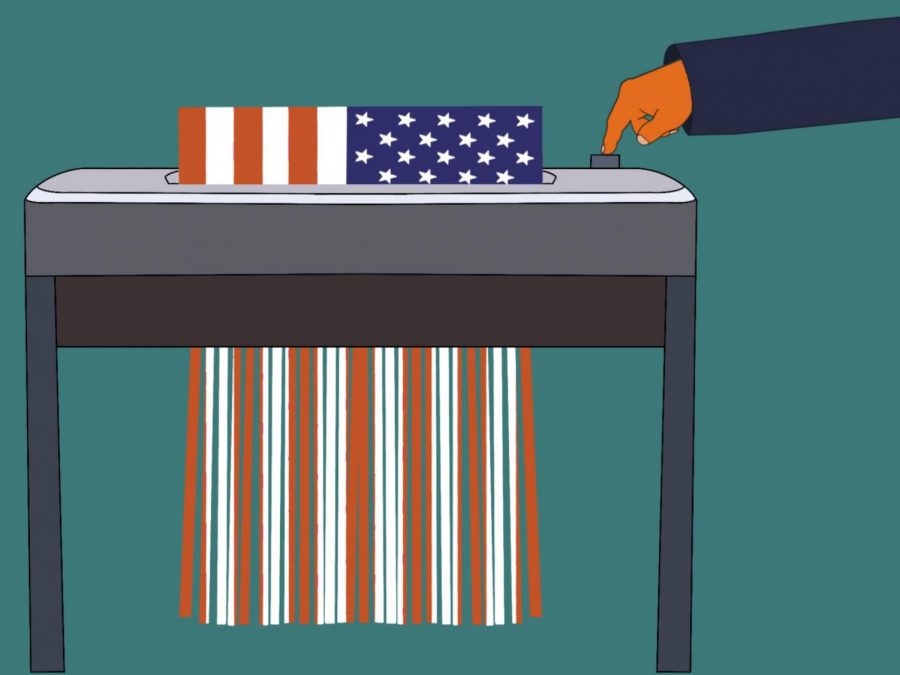Trump administration seeks to rewrite history with ‘1776 Commission’
President Trump’s 1776 Commission aims to teach youth about the “magnificent truth,” seemingly composed of only the positive aspects of American history. By ignoring our past blunders, President Trump is suggesting we “shred” and ignore a great deal of America’s history.
November 7, 2020
Many states, cities and people have begun celebrating “Indigenous People’s Day” on the second Monday of October instead of celebrating “Columbus Day”. Many believe that Christopher Columbus doesn’t deserve to be celebrated for his actions, which resulted in the decimation of the Native American people.
President Donald Trump and his administration have strongly pushed back against this reasoning, issuing a proclamation claiming that “radical” activists want to undermine Columbus’s legacy and revise history.
However, President Trump seems to be seeking to revise history himself. The President announced and signed an executive order creating the 1776 Commission, a council intended to protect and promote “patriotic education.” The commission aims to teach youth about the “magnificent truth,” seemingly composed of only the positive aspects of American history. There’s no doubt that America is a successful country, but by claiming that America is the “most exceptional nation in the history of the world” and not addressing our past blunders, President Trump is suggesting we ignore a great deal of America’s history.
AP United States History teacher Mary Van Atta sees Trump’s statements about Columbus and his creation of the commission as more of a political statement than an actual promise to overhaul curriculum, used as an “election-year tactic(s) to appeal to voters who favor him.” Many conservatives have previously renounced the 1619 Project, which is a New York Times Magazine initiative that aims to refocus curriculums on the consequences of slavery and the contributions of Black Americans. The project seeks to reframe American history as starting when the first slaves arrived in America in 1619, rather than 1776, when the Declaration of Independence was published.
The 1776 Commission seems designed to work in opposition to the 1619 Project. When announcing the commission, President Trump described the project’s goal as an attempt to “rewrite(s) American history to teach our children that we were founded on the principle of oppression, not freedom.” But it’s not that simple.
The Founding Fathers created a system that gave people freedom from “taxation without representation” and “unalienable rights,” but those rights and freedoms only applied to white men. Black men didn’t receive the right to vote until the Fifteenth Amendment in 1870 (and didn’t receive full voting rights for almost a century), women didn’t receive the right to vote until 1919, and Native Americans couldn’t vote in every state until 1962. This country might have been founded on the principles of freedom, but those freedoms were built to only apply to white men. By suggesting we ignore systemic oppression that minority groups have gone through, this proposed “patriotic education” is erasing what truly makes America great — our population’s ability to fight for freedom and justice for all.
The 1776 Commission’s goal is to “clear away the twisted web of lies in our schools,” but by covering up oppression, they’re just creating another “web of lies.” Furthermore, the federal government has no jurisdiction over curriculum, so the commission isn’t doing anything but stating the Trump administration’s goal of covering up the past. No matter how hard the Trump administration wants it to, the systemic racism that penetrates our country isn’t going to go away on its own. To address our country’s race problem, we first must address the glaring inequalities between races.
That’s exactly what the 1619 Project aims to teach. A statement on its website asserts that “by acknowledging this shameful history, by trying hard to understand its powerful influence on the present … we can prepare ourselves for a more just future.” Van Atta agrees, and said that “while it has produced provocative discussion, it has served far more to expand the historical record of an under-represented sector of our population.”
The 1619 Project isn’t perfect, either. There are criticisms over whether 1619 is more of a metaphorical (when the oppression began) or actual (when our country began) founding date. Many others, such as President Trump, think the goal of the 1619 Project is to cover up all of America’s triumphs with its downfalls. Bret Stephens, an opinion columnist for the New York Times, puts it best when he discussed how journalism works best when it tries not to create a definitive record of history. The 1619 Project isn’t trying to say that the subjugation of African Americans is all we should focus on when discussing our country’s history: it’s just asking that we don’t ignore slavery and its legacy.
What both the 1619 Project and 1776 Commission somewhat reject is the idea that history isn’t in black and white. There’s no definite start to our country, but we do know that America was founded on principles of freedom and equality. Though these freedoms didn’t, and still haven’t, become a reality for all Americans, by coming to terms with the fact that our country oppressed minorities from the very start, we’re coming closer to making those freedoms a reality. True patriotism and love for your country includes recognizing its past failures as well as its successes and working towards improvement. The 1776 Commission moves us in the opposite direction.







